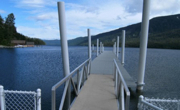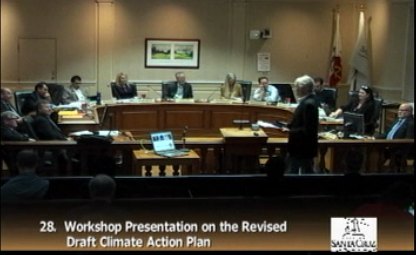Note: for Jan Lundberg's mini-presentation on sail power and the U.S.-China debt-for-nature swap, go to this link http://64.175.136.240/sirepub/mtgviewer.aspx?meetid=240&doctype=AGENDA. At the video scroll forward from beginning to the marking of 4:29:54 or before, and play a little over three minutes to Jan's conclusion at 4:33:23. An hour before him is the beginning of the formal presentation to the City of Santa Cruz on its Draft Climate Action Plan, at time-stamp 3:31:40. Here is an update on presenting the local Sail Transport Network's agenda and vision for the Bay of Monterey and beyond. At the Santa Cruz City Council meeting of January 24, 2012, on the occasion of the Draft Presentation of the Climate Action Plan, Jan Lundberg supplied a public comment. As the City of Santa Cruz -- known as much for its being a progressive town politically as it is for its good surfing -- aims to cut its greenhouse gases, some goals are too modest, such as cutting within-town car-trips' emissions by only 10% by 2020. So Jan took three minutes to chime in on transportation: "If I can stress two words to add the Plan, here they are: Sail power." Here are the other points I managed to make, after identifying myself as "Jan Lundberg, with CultureChange.org and the Sail Transport Network. I'm a former oil industry analyst who would like to comment on transportation alternatives: • You can sail from Santa Cruz to Monterey in a monohull faster than taking public buses to get there. • It's an ocean Sanctuary, so we need to honor and enjoy the ocean. Picture tall ships at our wharf. • Sail power is the cleanest, most efficient energy: wind over the water, but it isn't considered a factor as a technology or industry in either Washington, D.C. or our innovative region. • World trade is based on the dirtiest oil, bunker fuel. Sixteen of the biggest cargo ships spew out as much air pollutants such as sulfur as all the world's cars. [Council members groaned at this bad news] • Today's cargo ships have slowed down to 15 knots, the speed of the clipper ships 150 years ago. [Hmm..!] • We appreciate our organic coffee, but what about how it is brought to us? • One way for sail power to get going is through climate protection. The UN meeting in Durban was a flop, but fortunately there is a way to bring about meaningful action: • A debt-for-nature swap between the U.S. and China would be sort of like the deals made to protect rainforest in South America. The U.S. is greatly indebted to China, but if we cut our carbon emissions and let China take the credit, that country can benefit from future Kyoto requirements on emissions, simply by writing off a good portion of U.S. debt. Overdue U.S. energy-conservation policies plus local incentives that save energy and cut carbon emissions would make this treaty happen." [background articles on Culture Change http://www.culturechange.org/cms/content/view/803/1/ ] Jan invited anyone to meet with him to discuss projects for the Monterey Bay. He will follow up with the City's climate action coordinator, Ross Clark, who received Jan's business card. Jan mentioned to the communiity's pedal-power leader at the meeting, Micah Posner, that bikes and bike-carts would be the land linkage to sailing ships calling. Does your city have a climate action plan, and does it factor in pedal power and sail power to the extent you feel necessary for the post-oil future? For the Santa Cruz plan go to http://www.cityofsantacruz.com/index.aspx?page=1108 |
|||
 |
||
|
|

